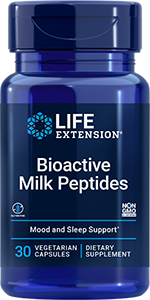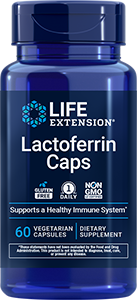
Colostrum vs. Milk Supplements: What's the Difference?
Published: January 2025
In case you don't keep abreast of the latest trends in the wellness industry (pun intended), we're here to tell you that some of the most buzzworthy products in recent years are colostrum supplements.
Yes, colostrum, as in breast milk for babies. Often referred to as "liquid gold" because of its rich nutrient profile, colostrum is the first milk mammals produce in the initial days after birth, and transitions into mature milk after a few days.
So how do these and other milk-derived supplements work, and should you (someone who is not, presumably, a baby) be taking them? We asked Dr. Crystal M. Gossard, DCN, CNS, LDN, for the details on supplements that contain milk (which, for the purposes of this article, refers to bovine or cow's milk).
What are colostrum supplements?
As the name suggests, colostrum supplements contain the first milk from cows who have just given birth. If you've ever been in a maternity ward (particularly as a patient yourself!), you're aware that new mothers are urged to nurse after delivery to pass along protection to their new babies, even if they don't intend to breastfeed after leaving the hospital.
As Dr. Gossard explained, there's a good reason for that! "Breast milk is designed to protect babies at a vulnerable stage of development," she explained. Perhaps this is why colostrum contains proteins, growth factors, vitamin A, magnesium, zinc, antibodies (or immunoglobulins), and other bioactive compounds essential for providing babies with the necessary nutrients to build and strengthen their digestive and immune systems.
"Colostrum shines for its immune benefits thanks to its high concentration of immunoglobulins (antibodies) and other bioactive compounds," she said. "Additionally, colostrinin (derived from colostrum) is a bioactive compound that's well-studied for promoting memory health." Along with other nutrients studied for their brain benefits, you'll find colostrum in some memory supplements.
So, if you're looking to "baby" your natural brain function, ask your healthcare provider if adding a colostrum-derived supplement is right for you.
What is the difference between milk and colostrum?
The nutritional content of the early milk mothers make (regardless of the species) in the first few days after giving birth is different than the milk some of us drink with our coffee. Mature milk, Dr. Gossard explained, doesn't have the concentrated levels of hormones, growth factors, and other bioactive compounds that are in colostrum.
"Instead, milk has higher levels of lactose and vitamin A, and maintains high levels of the protein casein," she explained. Casein, which is the primary protein in milk—especially in bovine (from dairy cows) milk—is a large protein that can be hydrolyzed, or broken down, into smaller pieces known as bioactive peptides.
When you take a milk supplement, you're likely getting bioactive peptides derived from bovine milk; colostrinin is a bioactive compound in colostrum-derived supplements. Both of these forms of milk-derived supplements offer well-studied, but distinct, health benefits.
Who should take milk supplements?
In their various forms, milk-derived supplements can support:
Muscle mass
: Hello, whey protein powders! Whey protein supplements contain a higher concentration of bioavailable essential amino acids, including leucine, isoleucine and valine, the branched-chain amino acids crucial for building and maintaining muscle mass.Immune function
: Milk-derived whey protein and lactoferrin supplements have been shown to help maintain a robust immune response.Relaxation and restful sleep
: Studies show that bioactive peptides promote a healthy mood and stress response, and help encourage the quality sleep your body craves.Healthy gut flora
: Milk-derived lactoferrin supplements can help promote beneficial bacterial growth in the intestines.
Benefits will vary from formula to formula, noted Dr. Gossard, so it's important to read the label. "A milk-derived supplement can offer targeted benefits depending on your goals," she said, adding that you should speak with your doctor or nutritionist before adding (any) supplements to your routine.
And don't discount the benefits of drinking milk, either! "Milk is an excellent part of a balanced diet, provided it suits you," Dr. Gossard pointed out. Pro tip: Look for organic, grass-fed milk.
Explore Our Best Immune Support Supplements
The Three Stages of Breast Milk
Whether you're nursing your third newborn baby or exploring the joys of motherhood for the first time, you've no doubt marveled at the wonder that is breast milk production.
As Dr. Gossard explained, breast milk is like a personal "cocktail" of health-promoting benefits for your baby, and it has three stages:
Colostrum
: The thick breast milk that's deep yellow in color. Your body produces colostrum during pregnancy and just after birth.Transitional milk
: This second stage occurs two to five days postpartum as your breast milk matures and gradually replaces colostrum.Mature milk
: The third stage of breast milk comes about 10 to 15 days after birth. It becomes the primary milk you'll produce throughout your breastfeeding journey. Mature milk is a combination of water, proteins, fats, carbs, vitamins, minerals and antibodies.
And that's just the tip of the iceberg! Your breast milk adapts to your baby's needs when feeding. How? A cascade of biological reactions takes place, but in a nutshell, "it starts with a quick suckle on your nipple," explained Dr. Gossard. Your body "reads" your baby's saliva, gets a summary of how your baby is doing and what nutrients they need, and changes your breast milk's nutrient composition to meet your baby's needs—every single time you breastfeed.
Can I take milk supplements if I have a dairy intolerance?
It's true that both colostrum and milk-derived supplements, like lactoferrin, are considered dairy products. Should you worry about the lactose content? This will really depend on the supplement, according to Dr. Gossard.
For example, bioactive milk peptides may contain very little to no lactose, whereas whey powders might have lactose. If lactose is a concern to you, speak with your doctor or nutritionist before adding whey or colostrum supplements to your daily habits. A plant-based protein powder or plant-based milk may be a better option.
Colostrum vs. milk supplements: how do I choose?
Identify your health goals: that's the best way to decide which supplement will complement your routine, said Dr. Gossard. "Write it down or get creative! Make a wellness vision board with your health goals, daily habits and the supplement regimen to complement them," she added. "It's a fun and organized way to keep yourself consistent."
Whether you want to build or maintain muscle mass, encourage a healthy mood, nourish your memory, or support a robust immune response, adding the right supplement is a proactive "whey" to help your body thrive at every age.
Here's a cheat sheet to help you choose the right supplement for your needs.
Immune support
: Lactoferrin, whey or colostrum supplementsSleep quality
: Bioactive milk peptides, which also support mood and a healthy stress responseMemory protection
: Colostrinin (derived from colostrum)Muscle maintenance
: Whey protein powders
Pro tip: Take a quiz to get customized recommendations on mood-nourishing supplements!
References
- Baskiewicz-Halasa M, et al. "Moderate Dose Bovine Colostrum Supplementation in Prevention of Upper Respiratory Tract Infections in Medical University Students: A Randomized, Triple Blind, Placebo-Controlled Trial." Nutrients. April 2023. https://pubmed.ncbi.nlm.nih.gov/37111143/
- Duan H, et al. "A Review: The Effect of Bovine Colostrum on Immunity in People of All Ages." Nutrients. June 2024. https://pubmed.ncbi.nlm.nih.gov/38999755/
- Feng Z, et al. "Unravelling the Proteomic Profiles of Bovine Colostrum and Mature Milk Derived from the First and Second Lactations." Foods. November 2023. https://pmc.ncbi.nlm.nih.gov/articles/PMC10670645/
- Kim HJ, et al. "A Double-Blind, Randomized, Placebo-Controlled Crossover Clinical Study of the Effects of Alpha-s1 Casein Hydrolysate on Sleep Disturbance." Nutrients. June 2019. https://pubmed.ncbi.nlm.nih.gov/31252661/
- Li ML, et al. " Improving sarcopenia in older adults: a systematic review and meta-analysis of randomized controlled trials of whey protein supplementation with or without resistance training." J Nutr Health Aging. April 2024. https://pubmed.ncbi.nlm.nih.gov/38350303/
- León-López A, et al. "Milk Whey Hydrolysates as High Value-Added Natural Polymers: Functional Properties and Applications." Polymers (Basel). March 2022. https://pmc.ncbi.nlm.nih.gov/articles/PMC8955172/
- Playford RJ, Weiser MJ. "Bovine Colostrum: Its Constituents and Uses." Nutrients. January 2021. https://pmc.ncbi.nlm.nih.gov/articles/PMC7831509/
- Ramsing R, et al. "Dairy and Plant-Based Milks: Implications for Nutrition and Planetary Health." Curr Environ Health Rep. June 2023. https://pmc.ncbi.nlm.nih.gov/articles/PMC10504201/
- Zheng L, et al. "Chapter 7—Production of Bioactive Peptides from Bovine Caseins." Foundations and Frontiers in Enzymology. 2023. https://www.sciencedirect.com/science/article/abs/pii/B9780323960106000072
- "Lactium." https://www.lactium.com/what-is-lactium/frequently-asked-questions/
- "The Phases of Breast Milk." U.S. Department of Agriculture. https://wicbreastfeeding.fns.usda.gov/phases-breast-milk
- "What is mature breast milk?" Medela. https://www.medela.com/en-gb/breastfeeding-pumping/articles/power-of-breastmilk/what-is-mature-breast-milk
Always be in the know!
Access the latest deals, wellness news, expert health tips & more!









